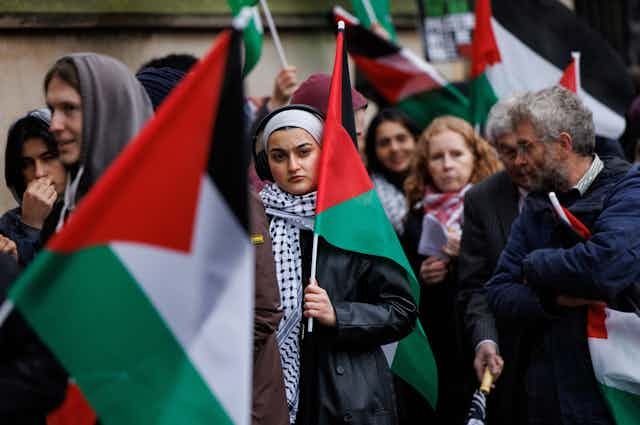Unhappy with large protests against the increasingly dire situation in Gaza, Prime Minister Rishi Sunak is seeking to update the UK’s definition of extremism. This, he has argued, is needed because “our democracy itself is a target” of antisemitic and Islamophobic extremists.
However, the reality is that no measures do more damage to democracy than policy proposals like the one Sunak is promoting.
The UK already has a definition for extremism, which is used in efforts to tackle terrorism. We may think of the police as leading those efforts, but the UK’s Prevent strategy now also places a duty on certain other authorities to “have due regard to the need to prevent people from being drawn into terrorism”.
These authorities include local government, education institutions and the NHS. In reality, the UK has placed teachers and NHS staff on the frontline in the fight against terrorism, on top of all their other duties that they were actually trained to do.
To help those with a duty under Prevent to identify people at risk of being drawn into terrorism, the government currently defines extremism as “vocal or active opposition to fundamental British values, including democracy, the rule of law, individual liberty and mutual respect and tolerance of different faiths and beliefs”. Also included are “calls for the death of members of our armed forces”.
This definition is not contained in any law, however. Instead, it features in the government’s Prevent guidance. A key reason why this definition is not contained in legislation is because it is so vague and unclear. It would be difficult to legally oblige anyone with a duty under Prevent to apply the definition – and even more difficult for a court to determine what it means.
Even as guidance, there are still problems with the definition. It offers enormous discretion to the people deciding who is at risk of being drawn into terrorism. Discretion can lead to inconsistent application. That, in turn, can lead to discrimination.
Vague to vaguer
It has been suggested that the new definition of extremism will include the “promotion or advancement of ideology based on hatred, intolerance or violence or undermining or overturning the rights or freedoms of others, or of undermining democracy itself”.
What does it mean to undermine or overturn the rights or freedoms of others? Would arguing for the UK to leave the European convention on human rights count meet the bar?
Likewise, what does it mean to undermine democracy? Does excessive corporate lobbying do so? What about calling for restrictions on the right to free speech or the right to protest? These are fundamental rights that are absolutely necessary for a democracy to flourish. Would they be extremist?

Existing laws are enough
Sunak is presenting the new definition of extremism as a response to protests he depicts as being out of control. But the UK already has numerous laws in place to tackle what it considers to be unacceptable behaviour at protests. The Terrorism Act (which is also incredibly broad) can be used to prosecute people who damage property or create a serious risk to public safety during protests.
Counter-terrorism laws can also capture forms of expression at public demonstrations or online. It is already a crime to express support for a proscribed (unlawful) organisation, or to wear clothing, symbols or publish images in a way which can raise suspicion that you support an unlawful organisation. So, for example, if you express support for Hamas — a proscribed organisation — you are already committing a crime and can be prosecuted for it.
Meanwhile, the Public Order Act contains offences dealing with hate speech. These include using threatening, abusive or insulting words or behaviour, or displaying written material which is intended to or likely to stir up racial or religious hatred.
In 2022, the Police, Crime, Sentencing and Courts Act expanded the criminal offence of causing a public nuisance to include “serious distress, serious annoyance, serious inconvenience or serious loss of amenity”. This can now be applied by he police to criminalise protests that are considered to be making too much noise.
It is hard, therefore, to see which bases are not already covered for a government looking to prosecute people for extremism. These mechanisms have already been used to clamp down on all kinds of activism. In reality, there is no gap in the law that needs fixing. Rather, this proposal looks like a classic example of a government talking tough on crime and terrorism in order to boost its poll ratings in an election year.
The right to protest
Adding new definitions for extremism only creates problems. The vaguer a definition gets, the easier it is to misuse. It can also have a pervasive chilling effect on free speech. People may self-censor out of fear of being identified as extremist, not least when their employer has a duty under Prevent.
The fact of the matter is that human rights law allows for protests to be disruptive. Otherwise, they could be simply ignored. Human rights law also allows people to “shock, offend, and disturb” through speech.
The government may not be happy with large public protests against its foreign policy but it should not be viewed as extremist to march for a ceasefire in Gaza. Likewise, it should not be viewed as extremist to vocalise opposition to the potential genocide being committed by the Israeli Defence Forces. If this were so, then the International Court of Justice is extremist.
There is a deep danger of conflating protest with extremism and terrorism, undermining the legitimacy of these protests. To stretch the concept of extremism to cover these views is what is actually undermining democracy and the rights and freedoms of others.

